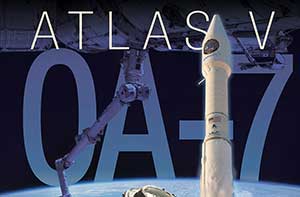ULA Atlas V Rocket Launch From Cape Canaveral Postponed Due To ‘Booster Hydraulic Line’ Issue
By Space Coast Daily // March 23, 2017
New Launch Time TBA

BREVARD COUNTY • CAPE CANAVERAL, FLORIDA – The launch of the ULA Atlas V rocket carrying the OA-7 Cygnus spacecraft for Orbital ATK and NASA has been postponed. While completing testing for a ground support hydraulic condition discovered during prelaunch testing, a different issue with a booster hydraulic line was observed.
The team is developing a plan to resolve the issue and a new launch date will be determined.
The Atlas V and Cygnus spacecraft remain secure.
Rocket/Payload: A United Launch Alliance Atlas V 401 will launch Orbital ATK’s Cygnus™ spacecraft on the initial leg of its cargo resupply mission to the International Space Station (ISS).
Mission Description: Orbital ATK developed the Cygnus advanced maneuvering spacecraft to perform ISS cargo delivery missions under the Commercial Resupply Service (CRS) contract with NASA. At a total weight of approximately 7,225 kg (15,928 lb), OA-7 will include approximately 3,380 kg (7,452 lb) of internal cargo and an 83 kg (183 lb) external deployer carrying CubeSats.
Launch Notes: This mission marks the third time ULA’s Atlas V has launched Orbital ATK’s Cygnus™ spacecraft on its way to the ISS. OA-7 will be the 71st launch of the Atlas V rocket since its first launch in 2002. The Atlas V 401 configuration rocket has flown 35 times, supporting a diverse set of missions, including national security, science and exploration, commercial as well as International Space Station resupply.













